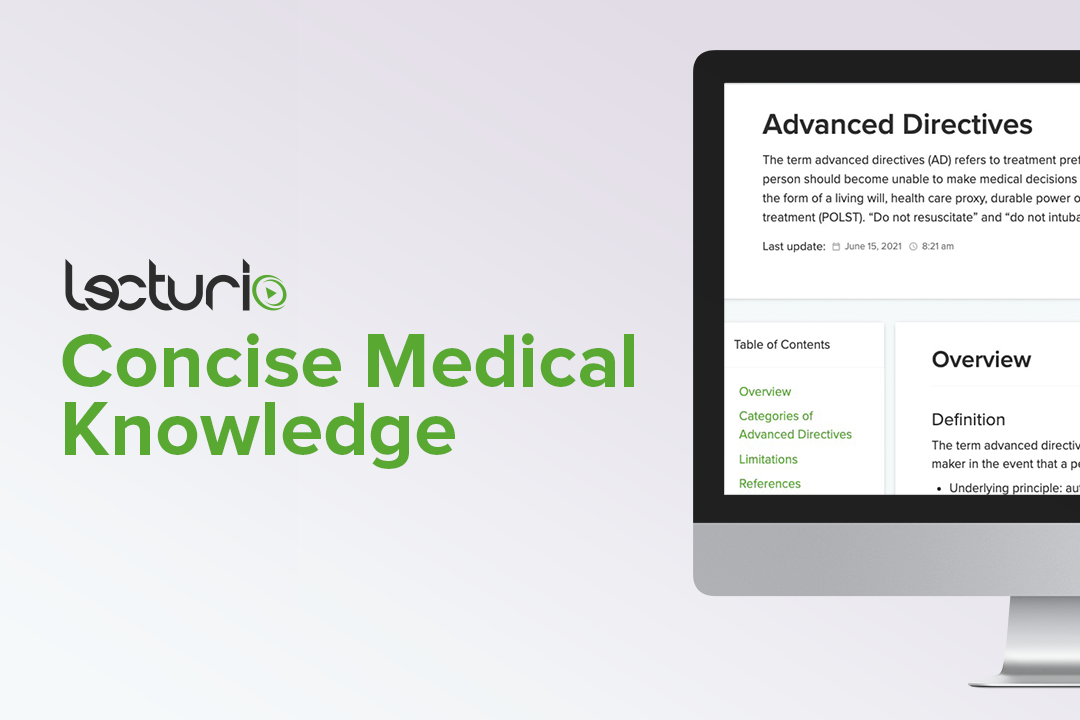Playlist
Show Playlist
Hide Playlist
Types of Advance Directives
-
Slides Types of Advance Directives.pdf
-
Download Lecture Overview
00:01 When you're talking about the actual forms, there are two kinds of advanced directive documents. 00:06 There's a living will, and there's a durable power of attorney for healthcare, otherwise known as I said, as a health care proxy or health care agent. 00:16 So, a Living Will are the actual instructions that might be put in the document about particular medical decisions, especially if a particular condition occurs, like the person has a terminal illness. 00:27 It does often comment on whether the patient would want comfort measures. 00:32 So if they are near the end of life, would they want comfort measures even if it might hasten their death? But it helps to relieve any kind of pain or discomfort that they might be having. 00:44 The difficulty with living wills is often they're just too general in language. 00:48 And they will still require interpretation based on a particular clinical context for the patient. 00:55 So for instance, there might be an advanced directive that says, "Well, if I'm in a permanent coma, I would never want artificial nutrition and hydration." But what if the person has a stroke, and is now in a minimally conscious state? They're not all the way being comatose, but they're minimally conscious. 01:12 Maybe the Advanced Directive document doesn't speak to that condition. 01:16 There's going to need to be interpretation by their healthcare proxy, in partnership with the health care team about how to handle those questions about life sustaining treatment. 01:29 I think the most important document better than the living will is going to be the durable power of attorney for health care. 01:36 So this is going to take effect anytime the patient loses decision making capacity. 01:40 It's not just when they have a terminal illness, but anytime they lose capacity, this person can step in and make decisions on their behalf. 01:49 It's important to note that it's not the same thing as a power of attorney for financial decisions. 01:54 So, some patients will designate a person to take care of their financial affairs. 01:59 If it's a document just for the finances, that does not mean that they can make decisions for healthcare decisions. 02:06 They have to make sure when they complete an advanced directive that's a durable power of attorney for health care that it is for health care. 02:14 That it is for these medical decisions. 02:18 And often, it gives the proxy broad authority to make any kind of healthcare decisions. 02:25 There may be limitations based on particular jurisdictions. 02:28 But in general, it allows the proxy to consent to medical procedures and the medical treatments to decide on who that patient's health care providers should be. 02:38 It could figure out, who is going to treat the patient? But also where they're going to be treated? Is it going to be in a hospital? Is it going to be a nursing home? Is it going to be at home? It's going to be an ability for this proxy to receive the patient's medical information. 02:53 Any health information that's going to be relevant to them making decisions that can get access to it. 02:58 So it's an aspect of thinking about respect for privacy of the patient. 03:03 this person is designated to receive this information to then serve as the authorized decision maker.
About the Lecture
The lecture Types of Advance Directives by Mark Hughes, MD, MA is from the course Breaking Serious News and Advance Care Planning.
Included Quiz Questions
What are the types of advance care directives? Select all that apply.
- Living will
- Healthcare power of attorney
- Healthcare proxy of attorney
- Healthcare power of proxy
- Surviving will
What is the problem with living wills?
- They are general in context and may require interpretation.
- They do not include specific wishes about comfort measures.
- They provide too much detail about wishes regarding intensive care.
- They are easily lost because they are not electronic documents.
- They prevent the healthcare proxy from making decisions.
Customer reviews
5,0 of 5 stars
| 5 Stars |
|
5 |
| 4 Stars |
|
0 |
| 3 Stars |
|
0 |
| 2 Stars |
|
0 |
| 1 Star |
|
0 |




